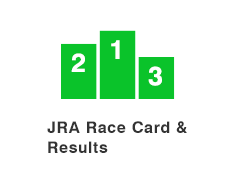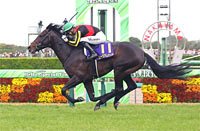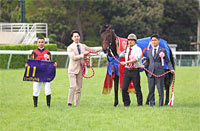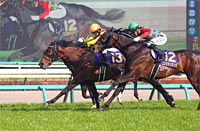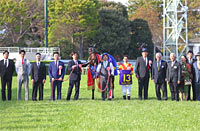Satsuki Sho (Japanese 2000 Guineas) (G1) - Data Analysis
Race determined by speed and agility
In 2016, the winner of the Satsuki Sho (Japanese 2000 Guineas) was backed as 8th favorite and the runner-up as 3rd favorite. In 2017, the winner was backed as the 9th favorite, the runner-up as 4th, and the third-place finisher 12th favorite. In 2018, the winner was backed as 7th, the runner-up 9th, and the third-place finisher 8th favorite. In other words, runners backed as 1st or 2nd favorites have all been beaten to 3rd or lower in the last three years. In light of this trend, we need to sufficiently consider the possibility that poorly favored runners will rise to the top again this year. With this in mind, let’s have a look at the data for the last 10 Satsuki Sho races, excluding the 2011 race that was held at Tokyo Racecourse.
Check performance by favoritism
As noted above, runners backed as 1st or 2nd favorite have struggled in the last three years, but if we look at performances by runners in the last 10 races under analysis in terms of favoritism, we observe that highly favored runners have delivered moderately strong performance. However, runners backed as 5th favorite were all beaten to 4th or lower, which is an interesting statistic. Runners backed as 6th to 9th favorites were strong performers and should be watched again this year. In addition, runners backed as 10th favorite or lower delivered lackluster performance, producing only two Top 3 finishers: Eishin Flash in 2010 (third place, 11th favorite) and Danburite in 2017 (third place, 12th favorite). [Table 1]
[Table 1] Performance by favoritism (last 10 races excluding 2011)
| Favoritism |
Performance
[1st-2nd-3rd-4th or lower] |
Win ratio |
Top 2 ratio |
Top 3 ratio |
| 1st favorite |
2-1-2-5 |
20.0% |
30.0% |
50.0% |
| 2nd favorite |
1-3-0-6 |
10.0% |
40.0% |
40.0% |
| 3rd favorite |
2-1-2-5 |
20.0% |
30.0% |
50.0% |
| 4th favorite |
1-1-2-6 |
10.0% |
20.0% |
40.0% |
| 5th favorite |
0-0-0-10 |
0% |
0% |
0% |
| 6th-9th favorite |
4-4-2-30 |
10.0% |
20.0% |
25.0% |
| 10th favorite or lower |
0-0-2-83 |
0% |
0% |
2.4% |
Conspicuous trends in performances by previous race
The fastest path to the Satsuki Sho is through prep races such as the Yayoi Sho or the Spring Stakes. However, looking at performances by runners in the last 10 races under analysis in terms of their previous race, we find that runners that had contested the Kyodo News Service Hai (Tokinominoru Kinen) last time out produced the highest number of winners. However, such runners produced zero runners-up or third-place finishers, with the Top 3 finishers mostly consisting of runners that had contested the Yayoi Sho or the Spring Stakes last time out, which is as expected. Runners that had contested the open-class Wakaba Stakes, another prep race for the Satsuki Sho, last time out struggled with zero winners, three runners-up before 2012, and only one third-place finisher since 2013. [Table 2]
[Table 2] Performance by previous race (last 10 races excluding 2011)
| Previous race |
Performance
[1st-2nd-3rd-4th or lower] |
Win ratio |
Top 2 ratio |
Top 3 ratio |
| Yayoi Sho |
2-5-4-32 |
4.7% |
16.3% |
25.6% |
| Spring Stakes |
3-1-2-41 |
6.4% |
8.5% |
12.8% |
| Kyodo News Service Hai |
4-0-0-5 |
44.4% |
44.4% |
44.4% |
G3 race at Nakayama
Racecourse |
0-0-2-4 |
0% |
0% |
33.3% |
| Other 3yo G3 race |
1-1-1-25 |
3.6% |
7.1% |
10.7% |
2yo Graded race in
previous year |
0-0-0-2 |
0% |
0% |
0% |
| Wakaba Stakes |
0-3-1-20 |
0% |
12.5% |
16.7% |
| Other Open-class race |
0-0-0-9 |
0% |
0% |
0% |
| 1-win class race |
0-0-0-7 |
0% |
0% |
0% |
Most strong performers had finished in Top 4 of previous race
Looking at performances by runners in the last 10 races under analysis in terms of finish in their previous race, we find that 29 of the 30 Top 3 finishers had finished their previous race in the Top 4. The exception was 2009 third-place finisher Seiun Wonder (8th in Yayoi Sho last time out). However, Seiun Wonder had notched two Graded race wins, including in the Asahi Hai Futurity Stakes. Combining this trend with the data in Table 2 should enable us to identify potential strong performers. [Table 3]
[Table 3] Performance by finish in previous race (last 10 races excluding 2011)
Finish in
previous race |
Performance
[1st-2nd-3rd-4th or lower] |
Win ratio |
Top 2 ratio |
Top 3 ratio |
| 1st |
7-4-5-47 |
11.1% |
17.5% |
25.4% |
| 2nd |
2-3-2-26 |
6.1% |
15.2% |
21.2% |
| 3rd |
0-1-2-20 |
0% |
4.3% |
13.0% |
| 4th |
1-2-0-8 |
9.1% |
27.3% |
27.3% |
| 5th or lower |
0-0-1-44 |
0% |
0% |
2.2% |
Check race record after start of the year
In the last 10 races under analysis, runners that had “finished in the Top 4 of a race held in the period between the start of the year and early February” finished in the Top 2 of each race except in 2013. Also, excluding 2009, the trend is that only “one of the Top 2” finishers had such records. In other words, it may be interesting to check if any of this year’s runners come with this kind of record. [Table 4]
[Table 4] List of Satsuki Sho Top 2 finishers that had finished in the Top 4 of a race held in the period between the start of the year and early February (last 10 races excluding 2011)
| Year |
Finish |
Horse |
Race in question |
| 2008 |
2nd |
Take Mikazuchi |
3 races back |
January 13 |
Nikkan Sports Sho Shinzan Kinen |
4th |
| 2009 |
1st |
Unrivaled |
2 races back |
January 24 |
Wakagoma Stakes |
1st |
| 2nd |
Triumph March |
3 races back |
February 7 |
3yo Maiden |
4th |
| 2010 |
2nd |
Hiruno d'Amour |
2 races back |
January 23 |
Wakagoma Stakes |
1st |
| 2012 |
2nd |
World Ace |
2 races back |
February 5 |
Kisaragi Sho |
1st |
| 2014 |
2nd |
To the World |
2 races back |
January 25 |
Wakagoma Stakes |
1st |
| 2015 |
1st |
Duramente |
2 races back |
February 1 |
Saintpaulia Sho |
1st |
| 2016 |
2nd |
Makahiki |
2 races back |
January 23 |
Wakagoma Stakes |
1st |
| 2017 |
2nd |
Persian Knight |
2 races back |
January 8 |
Nikkan Sports Sho Shinzan Kinen |
3rd |
| 2018 |
1st |
Epoca d'Oro |
2 races back |
February 10 |
Asunaro Sho |
1st |
Note: When there is more than one race in question, the most recent one is shown.
Seek out the winner!
Last three winners had finished in Top 2 of newcomer/maiden race with distance of 1,600m or less
The last three winners had all “finished in the Top 2 of a newcomer or maiden race with a distance of 1,600m or less.” Another point these winners had in common was that they had won a 1,800m+ race. It is often said that “speed” is most crucial in the Satsuki Sho, so it would seem a good idea to keep an eye on runners’ track record in short-distance races of 1,600m or less. [Table 5]
[Table 5] Newcomer or maiden race with a distance of 1,600m or less in which last three Satsuki Sho winners finished in Top 2
| Year |
Winner |
Race in question |
| 2016 |
Dee Majesty |
4 races back |
2yo Newcomer |
1500m |
2nd |
| 2017 |
Al Ain |
4 races back |
2yo Newcomer |
1600m |
1st |
| 2018 |
Epoca d'Oro |
3 races back |
3yo Maiden |
1600m |
1st |
(Yasunori Asano)
|







